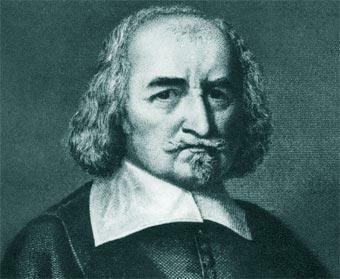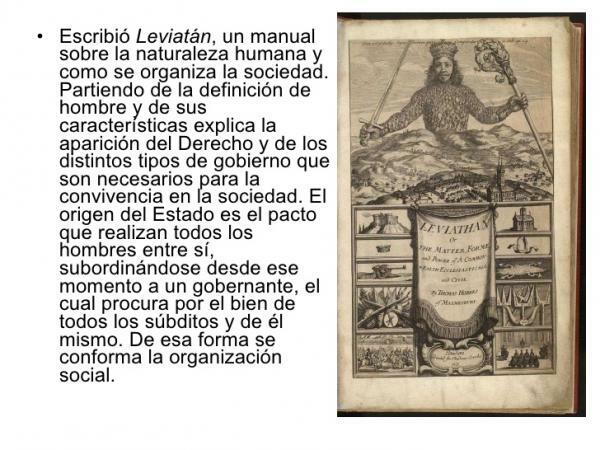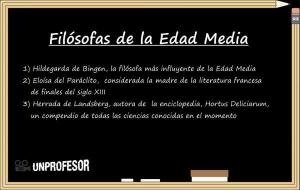Thomas Hobbes: main works

Image: Biographies and Lives
This lesson from a TEACHER is dedicated to main works of Thomas Hobbes, a controversial philosopher, who was accused as an atheist and even his books were burned. But his work breaks with the Middle Ages and supposes the beginning of the Modern Age, and in it he describes the political, social and cultural situation of the time, in a clear and precise way, with a lucidity worthy of admiration. Hobbes writes mainly about Politic science, but also on history, geometry, theology, ethics and philosophy in general. If you want to know more about the main works of Thomas Hobbes, continue reading this lesson.
Index
- The work of Thomas Hobbes
- De Cive or On the Citizen, (1642), one of the main works of Thomas Hobbes
- Leviathan (1651), the most important work of Thomas Hobbes
- On Liberty and Necessity (1654), another of Thomas Hobbes's major works
The work of Thomas Hobbes.
All the work of Thomas Hobbes constitutes a defense of
mechanistic materialism, by affirming that everything there is is physical, and therefore, there is no place for supernatural beings, soul, mind or any unnatural entity. Human beings, as animals that they are, are nothing more than machines.At the time the philosopher wrote his work, mechanism was in vogue among scientific society, because the field of physics He was advancing, giving much more precise explanations about the phenomena of nature, which until that moment, had not been understood well.
"¿What is the heart really but a spring; and what the nerves but different fibers; and what the joints if not wheels that give movement to the whole body?"
The human body, says Hobbes in his most important work, LeviathanIt is a machine, and even the entire universe is a machine, since it is material, and therefore has extension. However, the author clarifies that there are also spirits in nature, which despite having extension, do not can be perceived by human beings, although these spirits are primarily responsible for their activity.
In politics, Hobbes bets on a parliamentary monarchy, defending on the one hand, absolutism, and on the other, the sovereignty shared between the monarch, who receives his power from God and the people.
De Cive or On the Citizen, (1642), one of the main works of Thomas Hobbes.
This work is the first of the trilogy about Hobbes's theory of knowledge, which will be followed By Corpore o On the body, published in 1655 and From Homine o On Man, published in 1658.
The book is made up of three parts:
- Libertas (Liberia)
- Empire (Dominion)
- Religio (Religion)
The first part is dedicated by Hobbes to the theme of freedom as a natural condition of the human being. The human being lives free in a state of nature, only moved by his will. Already in the second part, he will speak of the need to constitute a government, in order to guarantee the security and peace among all human beings, who in a state of nature, lived in a constant war of all against all. The last part is a defense of the absolute power of the State and the submission of the Church to it.
We see, then, that he already anticipates themes, which will later be treated in his great work, Leviathan.

Image: SlideShare
Leviathan (1651), the most important work of Thomas Hobbes.
The Leviathan, constitutes a treatise on political philosophy that addresses issues such as the origin and constitution of society or the nature of the human being, as John Locke will also do in his work Two Tratted Swork the Gobierno Ccivil, by John Locke, and Rousseau, in The Ccontract Sofcial. In this work, the philosopher develops his theory of legitimate states and governments, while trying to find an objective foundation for morality.
In this work, he describes the human being in the State of Nature, a vile and evil being, only moved by desire, a desire, which often collided with the desire of another, provoking the war of all against all. For Hobbes, the human being is bad by nature. Man is a wolf to man, he says. This constant struggle justifies the need for a social contract, by means of which they give up part of their natural rights, of their natural freedom, in exchange for freedom. In this way, the State is born, compared in the book with the biblical monster, Leviathan.
The law, and the different types of government, says Hobbes, are essential in a society that seeks peaceful coexistence among all human beings. In this way, people delegate their power to another, that is, to the monarch, who has absolute power, but at the same time, it must guarantee the peace and security of the people.

Image: SlideShare
Of freedom and necessity (1654), another of the main works of Thomas Hobbes.
This work, which was published without Hobbes's consent, was originally a private letter addressed to the Marquis of Newcastle, and is an essential text for understanding the concept of Liberty of the philosopher.
The book recounts the famous dispute between Bishop Bramhall and Hobbes, and in this debate, topics of great importance are dealt with, such as freedom, laws and the obligation to obey them, the absolute power of the sovereign or political rebellion.
Hobbes, will defend the constitution of sovereignty, as a means to avoid war and guarantee peace within society. East sovereign power, It must be absolute, not being subject to any superior will, other than that of God, from which his power emanates, but it will never be subject to the power of the Church. Any act of insubordination will be understood as an act of resistance.
And it is that for the philosopher, it is not possible to guarantee peace among all human beings, without total obedience to the sovereign, who sets the laws, in order to guarantee the wellcommon.
If you want to read more articles similar to Thomas Hobbes: main works, we recommend that you enter our category of Philosophy.
Bibliography
Hobbes, T, 1651. Leviathan. Ed. Planet, 2018



